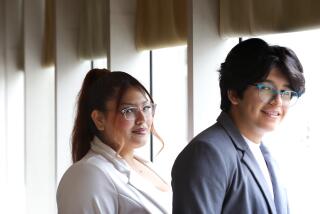Seminar’s Promise: 40 Specific ‘Assets’ Will Aid Students
- Share via
What if your neighbors called you every time they saw your teenager running a red light? What if the bus driver greeted your child by name every morning? What if your family sat down to a healthful dinner at a beautifully set table every evening?
What if sprawling, balkanized south Orange County were transformed into a giant, Norman Rockwell-style small town?
Trudy Burrus, a community coordinator for the Saddleback Valley Unified School District, believes this would give students a feeling of support and belonging that would help them be better citizens, get better grades, shun drugs and alcohol, and even save their allowances.
What’s more, Burrus has convinced Saddleback and Capistrano Valley unified school district officials that they can start the transformation of South County by flying in a Minneapolis consultant for a three-day conference.
Starting this morning, Clay Roberts, a junior high school teacher turned consultant, will teach politicians, pastors, teachers and students specific things they can do to help build a local community for their children.
Starting with the 500 people who will attend the seminar this week, Burrus predicted the idea would soon spread to the entire community. “It’s going to reach critical mass,” she said. “We’re talking about changing the culture here.”
The cost of Roberts’ approximately $5,000 fee is being split by the Capistrano and Saddleback districts and the Irvine-based Community Service Program Inc. Local businesses are donating his hotel rooms, his car and food at many of the seminars and breakfasts where he speaks, Burrus said.
Roberts is a consultant for the Minneapolis-based nonprofit Search Institute, created 42 years ago to develop programs for youths in religious organizations, but which since has broadened its focus to study and create nonsectarian programs as well.
Institute researchers have developed a list of 40 qualities, values and supports that they say children need to grow up into healthy, caring and responsible adults.
Roberts will explain how businesspeople, parents, teachers and politicians can give children these things--the institute calls them “assets”--and in the process transform their communities.
“I think the community is ripe for wanting to do something like this for young people,” said Ron Dempsey, coordinator for the Capistrano Unified School District.
Roberts will tell residents they can help neighborhood children feel safe by gently reprimanding them when they catch them doing something wrong. He will tell teachers that stopping students in the hallway to shoot the breeze about sports can make them do better academically. He will exhort parents to get their children involved in community service, noting that children who spend an hour a week helping someone else wind up with higher grade-point averages.
“This is not the work just of schools,” Roberts said. “It is the work of the entire community.”
Rita Peterson, a professor of education at UC Irvine, said the assets program seems comprehensive and worthwhile. But Peterson expressed concern about asset No. 19, which calls for students to spend at least one hour a week in activities in a religious institution.
“The public schools are expected not to promote any particular religious affiliation,” she said. “But other than that, I think most educators would agree that developing these assets will help youth to resist high-risk behaviors.”
School officials said they have no plans to push religion on students.
“We recognize that it has a valuable role in kids’ lives, but it’s not our role to advocate it,” Burrus said.
But school officials said they do feel their role is to promote positive values, and this program offers a way to do it.
Laura Denos, a senior at Trabuco Hills High School and a member of the districts’ Asset Committee, which has been working to bring the seminar to Orange County, said she believes life would be better for many of her friends if the community emphasized the Search Institute’s values.
Though she comes from a religious family that already emphasizes many of the assets, Laura said many of her friends come from homes where parents seem more focused on work and money than on their children and communities.
“If one person had every one of these, they would be so close to perfect it would be unimaginable,” she said. “But if people possessed more of these qualities . . . their minds and hearts will be in the right place. . . . In due time, it will improve the community.”
More to Read
Sign up for Essential California
The most important California stories and recommendations in your inbox every morning.
You may occasionally receive promotional content from the Los Angeles Times.












